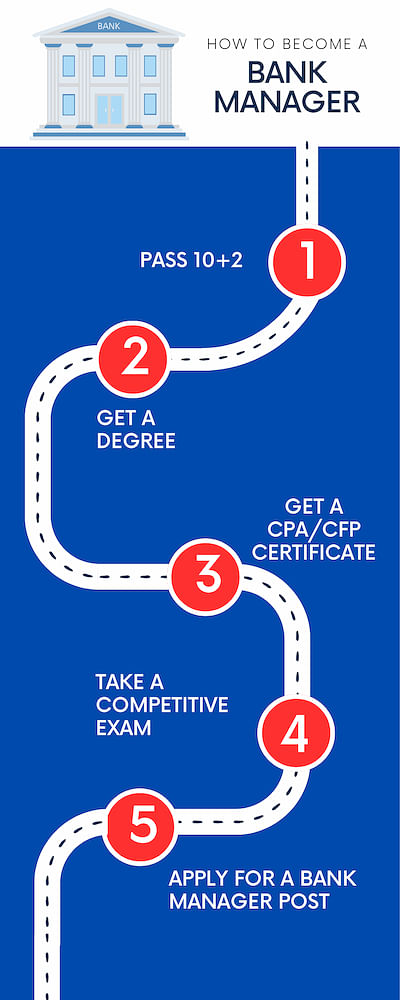Is being a Bank Manager your dream career option? Check out the complete step by step process on how to become a Bank Manager, Eligibility, Exams, Skills Required and Salary in 2023.
A Bank Manager is responsible for overseeing the workings of a branch. They manage the staff, create financial reports, manage customer-bank relationships, hire junior staff, and oversee loan undertakings. The employment opportunities for bank managers are 48% in banks, 21% in brokerage firms, 12% in insurance companies, and 9% in consultancies.
An ideal candidate must complete their 10+2 with Commerce subjects and Mathematics. Further, they must get a degree and take competitive exams such as IBPS PO and SBI PO to apply for Bank Manager posts in public sector banks. However, private institutions require candidates to have an MBA or Master’s degree with an Advanced Certification.
Table of Contents:
- How to Become a Bank Manager?
- Who is a Bank Manager?
- What Does a Bank Manager Do?
- Skills Required to Become a Bank Manager
- Career Progression of a Bank Manager
- Types of Bank Managers
- Salary of a Bank Manager
- Pros and Cons of Becoming a Bank Manager
How to Become a Bank Manager?
Candidates who wish to learn how to become a bank manager can follow the below instructions. All aspirants must begin preparations at the school level to get an early start on their banking career. `
- Step 1: Pass 10+2
- Step 2: Get a Degree
- Step 3: Get a CPA/CFP Certificate
- Step 4: Take a Competitive Exam
- Step 5: Apply for the Bank Manager Post

Step 1: Pass 10+2
Candidates must take Science or Commerce with Mathematics. Additionally, students can choose combinations such as Economics, Accountancy, Statistics, etc. Students must clear classes 10 and 12 with 60% aggregate marks from a recognised Board.
Step 2: Get a Degree
Candidates wanting to know more about how to become a bank manager after the 12th must take the relevant entrance exam and pursue an Undergraduate and Postgraduate degree in any of the following courses.
|
Courses |
Entrance Exams |
|
BBA Banking and Finance |
SET, GGSIPU CET, AIMA UGAT, CUCET, SUAT, GLAET, |
|
BBA Finance |
CUET, DU JAT, IP MAT |
|
BBA Accounting |
IPMAT, CUET, IPM Aptitude Test, NMIMS NPAT |
|
B.Com |
CSEET, NPAT, DU JAT, SET |
|
B.Com (Honors) |
Lucknow University Entrance Exam, AMU Entrance Exams, BHU UET |
|
B.Com Taxation and Finance |
JUEE, JMIEE, IPU CET, CUCEE |
|
B.Sc Accounting, Banking and Finance |
NPAT, CUET, CUSAT, SET |
|
M.Com Banking |
MGKVP, DUET, CUCET. |
|
M.Sc Banking and Finance |
CAT, XAT, SNAP, MAT, ATMA |
|
M.Sc International Banking and Finance |
SET, CUET PG |
|
MBA Banking and Finance |
CAT, MAT, GMAT, CMAT, XAT, NMAT |
|
PhD Business Administration |
UGC NET, GPAT, CSIR NET |
|
PhD Banking and Finance |
UGC NET, GPAT, CSIR NET |
Some colleges offering Banking courses are mentioned below,
- NMIMS
- RA Podar College of Commerce and Economics
- Symbiosis University, Pune
- Gargi College, New Delhi
- Manipal Academy of Higher Education
- Savitribai Phule Pune University
- Annamalai University
Step 3: Get a CPA/CFP Certificate
Candidates can further add certification into their qualification matrix, such as,
- Certified Financial Planner
- Certified Public Accountant
These certificates will help candidates gain the skills required as a Bank Manager.
Certified Financial Planner
CFP is an additional certification for students wanting to increase their financial planning skills. It is a 6 module course that teaches candidates about financial planning, risk analysis, insurance planning, retirement planning, employee benefits, investment planning, tax planning, and estate planning.
Certified Public Accountant
A CPA course aims at students who want to upskill by gaining accountant skills such as taxation, auditing, regulatory compliance, and financial analysis. The course must be completed within 24 months, wherein students must score 50% and above to receive the certification.
Step 4: Take a Competitive Exam
In India, candidates who wish to become a bank manager in the public sector must take competitive exams such as,
- IBPS
- SBI
Candidates can secure various posts by clearing the above-mentioned competitive banking exams. However, they must take a Probationary Officer exam to get placed in an entry-level post in a bank.
IBPS PO
The Institute of Banking Personnel Selection is the conducting body for the IBPS PO exam. It aims at recruiting Probationary Officers and Management Trainees. Candidates must clear the Prelims, Mains and Interview round to be eligible for profiles in the Banking sector. A total of 11 banks hire through the IBPS PO exam, which is conducted annually online.
|
Participating Banks |
|||
|
Bank of Baroda |
Canara Bank |
Central Bank of India |
Bank of Maharashtra |
|
Bank of Maharashtra |
Indian Overseas Bank |
Bank of India |
Punjab National Bank |
|
Union Bank of India |
Indian Bank |
UCO Bank |
- |
SBI PO
SBI releases a recruitment notification each year for the post of Probationary Officer. Candidates must clear all three stages of the SBI PO selection process such as prelims, mains and interviews. SBI PO selected candidates will get placed in banking administrative roles. Some highlights of the SBI PO exam are,
- It is a National Level exam conducted annually by the State Bank of India.
- SBI PO prelims is a 1-hour exam, and the mains are for 3 and 30 minutes.
- Each year around 10 lakh students register for SBI PO exams.
- Selected candidates get placed at SBI branches across India.
Once candidates gain 2 to 4 years of working experience, they will be eligible for the bank manager post.
Step 5: Apply for Bank Manager Post
Aspirants must apply for a Bank Manager post once they have all the required qualifications, certifications and experience. Banks require candidates to have at least 3 to 5 years of experience to apply for a Bank Manager post. Some of the top recruiters in the banking sector are mentioned below.
- State Bank of India
- HSBC Bank
- HDFC Bank
- Axis Bank
- ICICI Bank
- Kotak Mahindra Bank
- Barclays
- Citi Bank
- Yes Bank
- Bank of Baroda
- Bank of India
- Punjab National Bank
What Does a Bank Manager Do?
A bank manager's duties and responsibilities entail,
- Planning the operations and strategizing plans to increase the performance of a bank.
- Drafting budgets to run operations in a branch and allocate funds.
- Handling customer complaints and addressing concerns of existing and potential customers.
- Deal in areas of sales to make sure products and services are being sold to eligible customers while providing customer support.
- Prepare reports concerning accounting and financial information.
- Hire and onboard new employees.
Eligibility Criteria to Become a Bank Manager
Candidates willing to become a Bank Manager must meet certain requirements in terms of education, work experience, and certifications.
Education
Aspirants must have the following educational requirements to become a Bank Manager.
- Bachelor’s Degree in Finance, Mathematics, Business Administration and similar specialisations with 50% aggregate.
- Post graduate degree in Business Administration, Finance, Commerce, Taxation, Accounting.
- Candidates must qualify in competitive exams conducted by SBI and IBPS.
Work Experience
Further, candidates must gain relevant work experience in the banking, finance, insurance or related industries. Most companies require 3 to 5 years of work experience to become a bank manager.
Certificate
Candidates can also gain certifications such as,
- CPA
- CFP
This will help candidates improve their skills and gain more exposure in the industry.
Age Requirement
The age criteria to become a bank manager is 21 years. Candidates aged 21 years and above can apply to become a bank manager.
Skills Required to Become a Bank Manager
After studying the bank manager roles and responsibilities, aspirants must understand that to earn the post. They must possess certain skills. Therefore some of the bank manager skills are,
Organisational Skills
One of the key skills a Bank manager needs to have is organisation and people management skills. Since they are responsible for various tasks, they must be able to manage allocations, set timelines, work in teams, supervise and abide by company rules and regulations. They are accountable for all operations in a bank branch. Hence they must manage all undertakings with utmost care and professionalism.
Problem-Solving
Bank Managers must have a critical thinking approach, as they will face day-to-day problems in operations and handling customers and bank staff. They must use their knowledge and think objectively while reasoning and finding solutions. The end goal of a Bank Manager is to provide excellent banking services at their Branch.
Data Analysis
A candidate must be able to evaluate sales data, performance data etc., requiring strong mathematical, statistical and reasoning skills. They must be able to develop useful insights to communicate goals and meet the requirements of the Bank. Additionally, banks deal with a huge amount of funds. Hence Bank Managers must analyse and corroborate data to avoid any discrepancies.
Leadership
As a Bank Manager, candidates will lead a set of highly trained banking individuals, which requires supervising, leading, managing, understanding and being unbiased. Bank Managers must display exemplary leadership qualities as their performance and handling will uphold the Branch’s reputation. Moreover, they need to set an example for their subordinates.
Negotiation Skills
Candidates need bargaining and negotiation skills, which are required when looking at the job from a sales perspective. Bank Managers must be able to sell financial products and services to customers. This will result in collecting revenue and also gain customer loyalty.
Career Progression of a Bank Manager
First and foremost, candidates may take 3 to 5 years on average to make a career as a bank manager. However, it may vary depending on the qualification, work experience and skills of a candidate. In India, the career progression of a Bank Manager is as follows,
Junior Bank Manager
A Junior Bank Manager reports to the Sr. Bank Manager. They ensure that all tasks are completed as the Senior Bank Manager allocates. They supervise, assist and manage Junior grade bank staff. Moreover, they deal with daily customer handling, selling banking products etc.
Senior Bank Manager
A senior bank manager oversees day-to-day operations and provides customer service. Moreover, they train other banking personnel and help in the hiring process. They also help in creating future forecasts and drafting financial plans.
Service Manager
A service manager handles all service and customer-related tasks in the bank. They ensure that all services the bank provides align with the bank’s policies. They enable junior staff to sell products and set goals to meet objectives. They also oversee ongoing projects and ensure that customer queries are handled professionally.
Branch Manager
The Branch Manager is the head of the branch and is responsible for the overall management. They lead all major responsibilities such as hiring, approval of loans, fund utilisation, lines of credit, marketing, customer relationships etc. A branch manager ensures that all operations run smoothly and long-term objectives of the bank are achieved.
Types of Bank Managers
An aspirant can apply for Bank Manager roles in the following posts.
1. Financial Planner
A Financial Planner helps organisations meet financial objectives and handles the corporation's investments and finances.
- They evaluate factors such as goals, risk, and corporate stages and recommend investments for a business that will be beneficial in the long run.
- Financial Planners operate in small and large settings and help businesses meet their financial goals.
- They also work in insurance, budgeting, term-end plans, and tax planning.
2. Credit Manager
A credit manager manages and supervises credit management and plays a pivotal role in deciding credit limits.
- Their responsibilities are from the inception of credit granting to following up with credit policies.
- They manage existing customers' credits, assess potential customers' credit scores, and identify bad debts.
3. Certified Management Accountant
A certified management accountant is responsible for making corporate financial decisions. Moreover, they deal with accounting and handle financial information and data. They prepare financial statements, plan monthly to yearly financial funds, manage the ledger, prepare budgets and reports, forecast trends etc.
Salary of a Bank Manager
The average bank manager salary is INR 8,32,380 PA. At any entry-level post, candidates are paid up to INR 4,08,000 PA. Once candidates gain experience, they can receive a bank manager salary of INR 9,83,000 PA in India. Other allowances which they receive are medical, housing, etc.
Experience-wise Bank Manager Pay Scale
Candidates can further check India's bank manager pay scale depending on their experience level.
|
Experience in Years |
Average Salary |
|
Less than 1 Year |
INR 4,08,000 PA |
|
1 to 4 Years |
INR 6,23,0000 PA |
|
5 to 9 Years |
INR 8,98,000 PA |
|
10 to 19 Years |
INR 10,00,000 PA |
|
20 Years above |
INR 98,20,635 PA |
Source: Payscale.com
Specialisation-wise Bank Manager Salary
The specialisation-wise bank manager salary is mentioned in the table below.
|
Specialisation |
Average Annual Salary |
|
Marketing |
INR 4,60,000 PA |
|
Human Resource Management |
INR 5,07,000 PA |
|
Banking and Finance |
INR 5,20,000 PA |
|
Risk Management |
INR 6,23,000 PA |
|
Information Technology |
INR 7,90,000 PA |
|
Operation Management |
INR 8,40,000 PA |
Bank Manager Salary Structure
The below data has been sourced through payscale.com and showcases the bank manager salary structure in India.
|
Particulars |
Range |
|
Base Salary |
INR 3,46,000 to INR 10,00,000 |
|
Bonus |
INR 5000 to INR 29,600 |
|
Profit Sharing |
INR 3000 to INR 48,900 |
|
Commission |
INR 0 to INR 5,25,5000 |
|
Total Pay |
INR 3,80,000 to INR 10,00,000 |
Pros and Cons of Becoming a Bank Manager
Candidates wanting to become a bank manager must learn the pros and cons of becoming one.
Pros of Becoming a Bank Manager
Some of the Pros of becoming a bank manager are mentioned below,
- Bank Managers have an attractive salary package with multiple benefits.
- Working hours are fixed, and usually, overtime is not required.
- Candidates have a scope of upskilling with learning courses related to banking and finance.
- It is an ideal post for candidates skilled in quantitative analysis and people management skills.
Cons of Becoming a Bank Manager
Candidates can look at the cons of becoming a bank manager.
- It is a highly competitive career choice. Hence candidates must constantly add better qualifications and certifications to stay up-to-date in the banking industry.
- The career progression can vary from organisation to organisation.
- Candidates must manage and deal with different kinds of customers, requiring certain skills.

























POST YOUR COMMENT